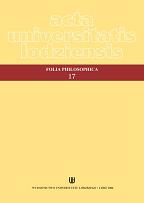Sen bycia, śmierć bytu
Dream of Being, Death of Entity
Author(s): Włodzimierz GromiecSubject(s): Philosophy
Published by: Wydawnictwo Uniwersytetu Łódzkiego
Keywords: Descartes; Schopenhauer
Summary/Abstract: "Traum des Seins, Todt des Seiendes" sketches centuries-old history, transformations, and consequences of the baroque identification of dream and reality. The first part of the essay demonstrates that, despite commonly accepted opinion this identification originates with Descartes. In the second part of the essay, the main theme – the claim that ontological positions are dependent on the grammar of ethic languages – is introduced within the context of Schopenhauer's remarks on life and dreams. The third part of the essay further develops the main theme in the course of an analysis of Descartes' "Meditation II". From a linguistic point of view, there are two following consequences for ego and cogito: either the subject (ego) does not exist, or its existence is temporarily non-continuous; either it does not exist as consciousness; or it is an unconscious being. Obviously, Descartes would accept neither. In the last analysis, ego exists merely grammatically, while (conscious) being differs from being in that it happens but is not. Since conscious being, only occurs in speech directed to somebody, death touches merely being, while being either dreams or remains silent.
Journal: Acta Universitatis Lodziensis. Folia Philosophica. Ethica - Aesthetica - Practica
- Issue Year: 2005
- Issue No: 17
- Page Range: 97-115
- Page Count: 19
- Language: Polish

